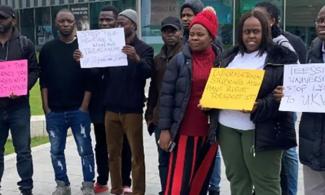
The university had previously reported the students to the Home Office, resulting in their removal from courses and orders to leave the UK.
Teesside University has announced plans to assist crisis-hit Nigerian students with funding for flights home, following a currency crisis that left many struggling to pay tuition fees.
The university had previously reported the students to the Home Office, resulting in their removal from courses and orders to leave the UK.
While this move has been seen as a positive step, one student has expressed concerns that the offer does not adequately address the broader impacts of the crisis, which continue to mount.
"The wide-rippling effects of this are unmanageable and piling up," the student said.
According to the BBC, Teesside University in Middlesbrough withdrew sponsorship for several students and notified the Home Office after they failed to pay tuition fees due to financial difficulties. The students, from Nigeria, had their savings depleted by the country's severe economic crisis. The university's change from a seven-installment payment plan to a three-installment plan further exacerbated their financial struggles.
A local food charity reported that 75% of its clients are now Nigerian students struggling to make ends meet. As a result, some students missed tuition payments, were barred from their studies, and received letters from the Home Office ordering them to leave the UK.
In May, a Teesside University spokesperson stated that non-payment of tuition fees constituted a violation of visa sponsorship terms, necessitating the university's reporting to the Home Office.
However, the university has now reversed its decision, allowing some affected students to continue their studies. A spokesperson confirmed that a relief fund has been established to assist a small group of students who need to return to Nigeria, covering unexpected travel costs.
The university has offered some students the option to complete their studies remotely from Nigeria or return to the UK at a later date.
According to the BBC, some affected students have initiated legal appeals against the decision to deport them to Nigeria.
A student, who wishes to remain anonymous, expressed disappointment and distrust towards the university's offer, feeling that it neglects the significant impact of their actions on those affected.
He said: "I was asked to return home, pay the balance remaining and apply to return at a later date, but I don't trust them now.
"I feel this is a way to escape responsibility and they may not let me come back.
"If they did, it would cost me thousands to pay flights, visa fees and NHS fees again.
"I've already spent so much coming here and now they want me to go back without any kind of certification to reflect my achievements.
"The whole aim of coming here was to study, we haven't committed any kind of crime.
"There's been no apology for the stress and trauma the university has put me through."
In May, the Nigerian government said it would intervene in the face-off between the management of Teesside University and Nigerians studying in the school who faced deportation from the UK.
The students had been told to leave the UK after failing to pay their outstanding tuition. They were thrown off university courses after the naira devaluation crisis left them struggling to pay tuition fees on time.
The government said the delegation would be led by a representative of the Nigerian Embassy in the UK, Amb. Christian Okeke and leaders of the Nigerian Students Union in the UK would visit the school to meet with the management on the allegations raised by the students.
In a statement released on Wednesday, May 29 by the Director of Media, Public Relations and Protocol, Nigerians in Diaspora Commission (NIDCOM), Abdur-Rahman Balogun, the affected students passionately narrated their ordeal and were optimistic about a positive intervention.